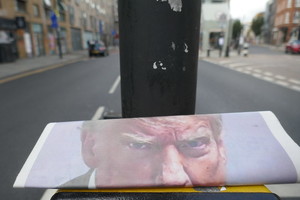When Voters Don’t Want Anyone to Be President

There was a time in American politics in which voters chose their candidates based on whom they held in the highest regard, weighing their options and making their selection based on which of their alternatives they held in higher regard and would perform more effectively in office. That era no longer exists.
We now live in an era of negative partisanship, in which most of us no longer mark our ballots for the politician who we like the most but rather who we hate the least. This trend has intensified over the last few presidential campaigns: both the 2016 and 2020 elections were arguably decided by so-called "double-haters," voters who were unhappy with both major party candidates and ultimately sucked it up to cast their ballot for the least objectionable available choice. Donald Trump dominated these voters in his campaign against Hillary Clinton, as they demonstrated not only their dislike for Clinton, but their frustration with the political system itself. Four years later, a smaller number of voters fit this description, but Biden’s ability to win the majority of these disaffected Americans keyed his overall victory.
This year, the number of double-haters is larger than ever, roughly one quarter of the entire electorate. But Trump now enjoys the advantage with this group, less because Americans have become more enamored with their former president (although Trump’s favorability numbers have increased slightly over the last two years), but because this year’s campaign is providing alternatives to the Democratic and Republican nominees that did not exist four years ago.
Voters who have categorically ruled out Trump now have options other than Biden. Most notably, Robert F. Kennedy, Jr. abandoned his Democratic primary challenge to Biden last year to instead run as an independent candidate in the general election this fall, and he is now drawing the highest poll numbers of a non-party candidate since Ross Perot more than thirty years ago. Progressive activists Jill Stein and Cornell West will not attract nearly as much support, but Democrats remember all too well how the small number of swing-state votes that Stein won in 2016 and that Ralph Nader took back in 2000 had an election-defining impact. And the No Labels movement is still promising to field their own candidate in the fall: recent media reports indicate that former New Jersey governor and committed anti-Trump attack dog Chris Christie is their latest target.
All this multiple-party activity is working to Trump’s benefit, as double-haters are no longer being forced to choose between two candidates they hate. For most of his career, Biden has always relied on the maxim, “Compare me to the alternative, not to the Almighty.” But while none of these challengers possess god-like attributes, voters are no longer limited to comparing the president only to the most visible alternative. The more voters who opt for Kennedy or one of the other intruders, the fewer votes will be needed for Trump to win November. There are enough Trump-haters in the electorate to prevent him from achieving a majority, but if enough of those votes are siphoned away from Biden, Trump can still return to the White House without reaching that threshold.
Biden’s supporters recognize the danger that these other candidates present to their man and have created an independent committee whose sole purpose will be to discourage voters from supporting any of them. But in the first election in more than one hundred years in which two presidents are on the ballot, there aren’t many voters who feel like they do not have sufficient information available to them about either Biden or Trump. In a 1-on-1 matchup, a Biden campaign that focuses on abortion rights and democracy would be designed to drive Trump-wary voters to the incumbent. But in a larger field, driving voters away from Trump does not necessarily mean they will move to Biden.
A lesser-of-two-evils approached worked very effectively for Biden in 2020. But this year, being less unacceptable than Trump guarantees nothing. This leaves Biden’s strategists with two options: they can either accelerate their efforts to drive down support for Kennedy and the other potential spoilers, or they can find ways to convince voters to like the current president more. But simply making them dislike Trump is no longer enough to win.
Want to talk about this topic more? Join Dan for his webinar "Politics In The Time of Coronavirus." Or read more of Dan’s writing at: www.danschnurpolitics.com.
Dan Schnur is a Professor at the University of California – Berkeley, Pepperdine University, and the University of Southern California, where he teaches courses in politics, communications and leadership. Dan is a No Party Preference voter, but previously worked on four presidential and three gubernatorial campaigns, serving as the national Director of Communications for the 2000 presidential campaign of U.S. Senator John McCain and the chief media spokesman for California Governor Pete Wilson. He has a Center bias.
This piece was reviewed and edited by Isaiah Anthony, Deputy Blog Editor (Center bias).
Photo Credit: AP Photo/Mike Stewart

April 26th, 2024

April 25th, 2024

April 25th, 2024